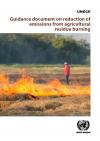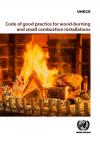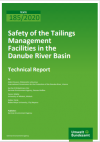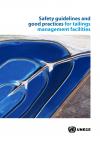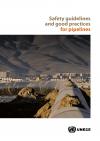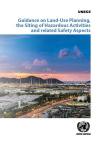Publications
Displaying Results 1 - 20 of 107
- English
Agricultural residue burning is a challenge in many countries in the ECE region, as well as at the global level. Substantial and clear evidence exists that fire use has negative impact on soil organic matter by reducing soil fertility and ultimately reducing yields. Moreover, the emissions generated by agricultural residue burning contribute to air pollution and are important drivers of climate
- English
The Guidance Document on Integrated Sustainable Nitrogen Management was prepared by the Task Force on Reactive Nitrogen. The purpose of the document is to mobilize Parties’ efforts to control pollution from agricultural sources in the context of the wider nitrogen cycle in an integrated manner harvesting multiple co-benefits of improved nitrogen management. The document is in particular aimed to
- English
Natural Hazards Triggering Technological Disasters (Natech) are becoming a growing concern for the international community and both private and public stakeholders. As climate change persists, extreme weather events such as heavy rains, lightening, floods and heatwaves are projected to be increasingly frequent and destructive, jeopardizing communities, livelihoods and industries. Accidents at
- English
Domestic wood heating is a major source of emissions of particulate matter, including black carbon (BC), and organic pollutants, such as dioxins/furans, polycyclic aromatic hydrocarbons (PAHs) and benzo[a]pyrene (B(a)P), in the ECE region, resulting in poor local air quality conditions and significant negative effects on human health. The present document responds to the need to inform the
- Pусский
Опубликовано: Ноябрь 2020
В целях поддержки компетентных органов и операторов в практической реализации Руководящих принципов и надлежащей практики обеспечения эксплуатационной безопасности хвостохранилищ Агентство по охране окружающей среды Германии (UBA) в 2016 г.
- English
In order to support competent authorities and operators in the practical implementation of the
- English
Parties, beneficiary countries of the Assistance and Cooperation Programme and other countries wishing to implement the UNECE Convention on the Transboundary Effects of Industrial Accidents sometimes face challenges in the interpretation of its provisions. Shedding light on the basic requirements of the Convention, this Guide offers a practical explanation of what compliance with this legal
- English
These safety guidelines and good practices have been developed to support governments, competent authorities and operators in minimizing the risk of fire and safely retaining firefighting water. They are intended to enhance existing practices and promote harmonized safety standards for firefighting water management and retention, in order to prevent accidental pollution of soil and water,
- English
The Joint Expert Group was established in 1998 to work on issues related to the prevention of accidental water pollution, in the context of the Convention on the Protection and Use of Transboundary Watercourses and International Lakes (Water Convention) and the Convention on the Transboundary Effects of Industrial Accidents (Industrial Accidents Convention), both serviced by UNECE. These
- English
This postcard provides a brief summary of the UNECE Safety Guidelines and Good Practices for Tailings Management Facilities which have been developed by the Joint Expert Group on Water and Industrial Accidents in cooperation with experts on tailings safety and UNECE. The Guidelines provide a set of principles, technical recommendations and good practices that can assist governments and
- English
This postcard provides a brief summary of the UNECE Safety Guidelines and Good Practices for Pipelines which have been developed by the Joint Expert Group on Water and Industrial Accidents in cooperation with experts on pipelines safety and UNECE. The Guidelines contain key principles and recommendations for the safe transport of hazardous substances by pipelines. They include specific
- English
This postcard provides a brief summary of the UNECE Safety Guidelines and Good Practices for Oil Terminals which have been developed by the Joint Expert Group on Water and Industrial Accidents in cooperation with experts on oil terminals safety and UNECE. The Guidelines provide a set of principles, recommendations and technical recommendations (including for design, planning, procurement,
- English
This postcard provides a brief summary of the UNECE Safety Guidelines and Good Practices for the Management and Retention of Firefighting Water which have been developed by the Joint Expert Group on Water and Industrial Accidents in cooperation with experts on firefighting water retention and UNECE. The Guidelines aim to support governments, competent authorities and operators by enhancing
- English
- English
The guide was prepared in a major inter-agency effort led by the United Nations Office for Disaster Risk Reduction (formerly known as UNISDR), the United Nations Environment Programme (UN Environment) and the United Nations Office for the Coordination of Humanitarian Affairs (OCHA), with a substantive contribution from UNECE and several other key agencies and institutions. The publication was
- English
- English
The Guidance on Land-Use Planning, the Siting of Hazardous Activities and related Safety Aspects has been developed in close cooperation with the constituencies under three legal instruments of the United Nations Economic Commission for Europe (UNECE) – the Convention on the Transboundary Effects of Industrial Accidents (Industrial Accidents Convention), the Convention on Environmental Impact
- English
The brochure has been prepared by the Inter-Agency Coordination Group for Industrial and Chemical Accidents. The Inter-Agency Coordination Group is an informal forum that brings together international organizations and institutions working on the prevention of, preparedness for and response to


